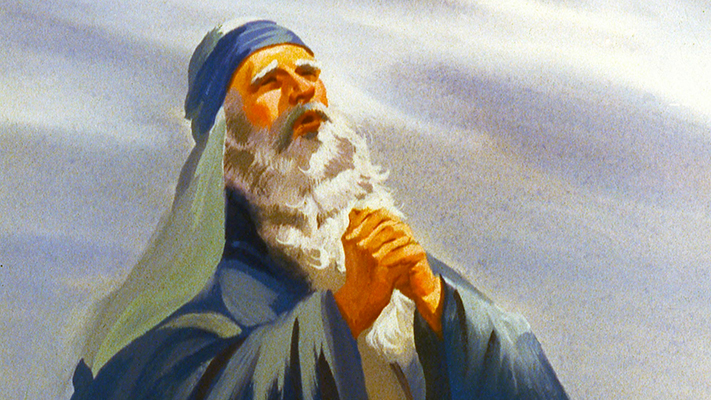Maybe God has favorites.

Some people get all the perks. Like Moses. “[Our] God is a consuming fire”*—stated twice by Moses himself (Deut. 4:24; 9:3). Except that Moses himself seems impervious to the flame.
Mo, the Friend of God
Think, for example, of God in Exodus 19: intense, passionate, dictating: “Consecrate [the people] today and tomorrow”; “Let them wash their clothes”; “Let them be ready for the third day”; “Set bounds for the people all around”; “Do not go up to the mountain or touch its base”: “Whoever touches the mountain shall surely be put to death” (Ex. 19:10-12). Think of the furious fuss to fence the mountain; to stand clear or die. But note that amid mountain fencing, terrifying thunder, impenetrable cloud but for lightning’s blinding flashes, through the thickest of smothering smoke and pealing trumpet God is calling His colleague Moses “to the top of the mountain” (verse 20), so the two of them may hold communion. It is an incomparable and continuous tryst between these two, “face to face, as a man speaks to his friend” (Ex. 33:11).
More than once, their talk is 40 days and nights per session (Ex. 24:18; 34:28). Until the glory smothered by smoke and cloud at the top of the mountain comes down to terrify the throng of humanity at the mountain’s foot: Moses, by no effort of his own, Moses, simply from being in the Lord’s presence, becomes a picture of glory that frightens his own people: “When Aaron and all the children of Israel saw Moses, behold, the skin of his face shone, and they were afraid to come near him” (Ex. 34:30). The fire doesn’t consume him: it makes him shine.
Mo, Whom God Avenges
And there’s more on Moses’ specialness. His older siblings want to prosecute a case against him, and the Lord Himself steps in to handle it, silencing Moses’ plea for gentler handling than the Lord deals out to his sister (Num. 12:1-15). In another case, God is ready to mete out destruction on the whole congregation [kol ha‘edah] for their sympathy with a group defined by brilliance, identified as the congregation’s most celebrated. Again, Moses wants mercy: God knows what my sin today will do to my brother and sister and father and neighbor tomorrow, infecting the whole like a runaway virus. Knowing, too, what it will take to stop it, He says to Moses and Aaron, “Separate yourselves from among this congregation [ha‘edah hazzo’t], that I may consume them in a moment” (Num. 16:21). The brothers fall to the ground on their faces and cry out to Him, “Shall one man sin, and You be angry with all the congregation [kol he‘edah]?” (verse 22).
Moses is forever calling on his God to show mercy. God is always acceding to Moses’ pleas. He changes His order: “Speak to the congregation [ha‘edah], saying, ‘Get away from the tents of Korah, Dathan, and Abiram’” (verse 24).
So Mo more than gets the perks: he calls the shots. Sometimes, at least. Sure, it didn’t work with Miriam. God shut him down. But it seems to have worked to some degree with the congregation—ha‘edah. God was going to sweep away everybody. Mo begged. God climbed down a step and targeted just the active rebels: “The ground split apart under them, . . . and swallowed them up. . . .So they and all those with them went down alive into the pit; the earth closed over them, and they perished from among the assembly” (Num. 16:31-33).
Mo, Human, After All
Except that it wasn’t enough. Because Mo doesn’t know everything. Not everything about sin. He doesn’t know what it can do if left to mercy without judgment. One day after God’s earth swallowed up the brilliant rebels, the congregation was clamoring against Moses and Aaron: “You have killed the people of the Lord” (Num. 16:41). God, who had shown mercy for Mo’s sake, still had to do a major purge: “And the Lord spoke to Moses, saying, ‘Get away from among this congregation, that I may consume them in a moment’” (verses 44, 45)—verses that make for awkward contrast with verses 20, 21: “And the Lord spoke to Moses and Aaron, saying,‘Separate yourselves from among this congregation, that I may consume them in a moment.’”
Weird or what? I’m wiping them out, Mo; get out of the way. But he doesn’t, because Mo begs for them. Tomorrow He will repeat Himself as Mo meekly grasps great truths: that there is sin that warrants ultimate discipline; that God alone and always knows when that’s appropriate.
There’s ominously more that Mo doesn’t know about sin: he doesn’t know what it can do to him: Israel, complaining again, wishes they could have died with the rebels instead of dying of thirst (Num. 20:2-5). God tasks Mo and his brother with acting out a miracle to rebuke the congregation’s intemperate spirit. Instead, Mo himself bursts out intemperately: “Hear now, you rebels! Must we bring water for you out of this rock?” (verse 10). Twice he slaps the rock with his stick. Out comes the water in abundance for the congregation and for their animals (verses 6-11). Whereupon, the Lord tells Mo and his brother, “Because you did not believe Me, to hallow Me in the eyes of the children of Israel, therefore you shall not bring this assembly into the land which I have given them” (verse 12).
Mo will climb the mountains and look across the Jordan River to Canaan’s land to which he had lived to bring in his people. But he will never enter at their head, because, the Lord explains to him, “in the Wilderness of Zin, during the strife of the congregation, you rebelled against My command to hallow Me at the waters before their eyes” (Num. 27:14).
And just like that we see that Mo is human after all, sinful after all, he of all the perks and mercy: no Canaan for Mo. No triumphant entry. No perks for sin. Forgiveness, yes, and translation too (Jude 9; Matt. 17:1-3; Luke 9:28-36). But for Mo, like me and you, rebellion is as unpardonable in a saint as it is in a sinner (1 Sam. 15:23); the wages of sin is always death (see Rom. 6:23); and full obedience is always of total importance.
* All Bible texts are from the New King James Version. Copyright © 1979, 1980, 1982 by Thomas Nelson, Inc. Used by permission. All rights reserved.








